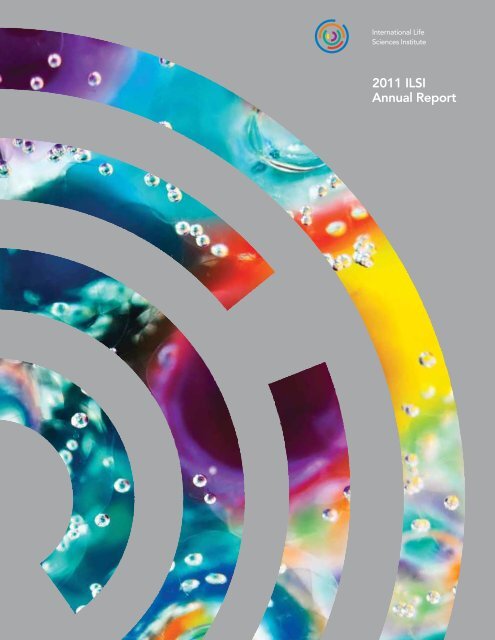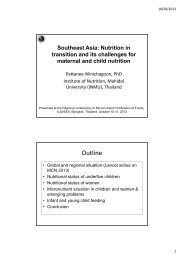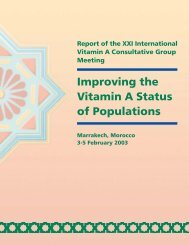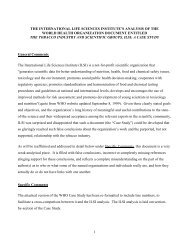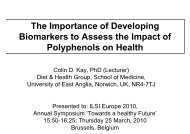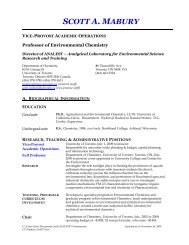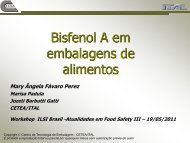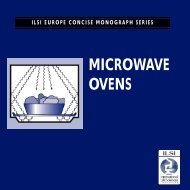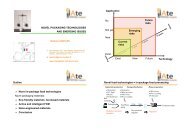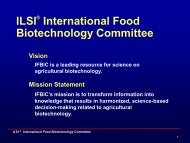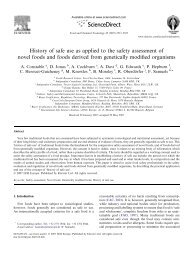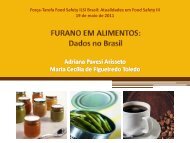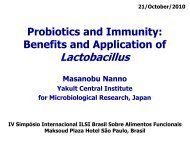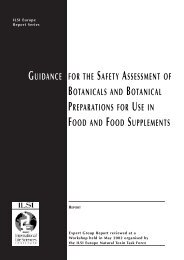2011 ILSI Annual Report - International Life Sciences Institute
2011 ILSI Annual Report - International Life Sciences Institute
2011 ILSI Annual Report - International Life Sciences Institute
Create successful ePaper yourself
Turn your PDF publications into a flip-book with our unique Google optimized e-Paper software.
<strong>International</strong> <strong>Life</strong><br />
<strong>Sciences</strong> <strong>Institute</strong><br />
<strong>2011</strong> <strong>ILSI</strong><br />
<strong>Annual</strong> <strong>Report</strong>
2 Letters from the President and Chair<br />
4 Global Issue: Water<br />
6 Global Issue: Risk Assessment<br />
8 Global Issue: Biotechnology<br />
10 Global Issue: Functional Foods<br />
12 Global Issue: Obesity<br />
15 <strong>2011</strong> <strong>ILSI</strong> Board of Trustees<br />
16 <strong>2011</strong> <strong>ILSI</strong> Members<br />
20 <strong>2011</strong> Revenue and Expenses
<strong>ILSI</strong> believes scientists from industry,<br />
academia, and government can and should<br />
work together in an open, transparent manner.<br />
The collaborative nature of our work – which<br />
is part of the larger body of scientific evidence –<br />
helps industries make safe, healthy products and<br />
helps governments provide effective and practical<br />
guidance to ensure public health and well-being<br />
and environmental safety.<br />
Fresh. Energetic. Bold.<br />
<strong>ILSI</strong> adopted a new logo in <strong>2011</strong> –<br />
one designed to catch the eye<br />
and convey the dynamism of<br />
the organization. It reflects the<br />
enthusiasm we have for our mission<br />
to deliver science that leads to a<br />
healthier world.<br />
While logo interpretation is often<br />
subjective, the abstract nature of<br />
the symbol has underlying meaning.<br />
The concentric circles simultaneously<br />
portray a stylized plasmid map<br />
signifying our focus on the life<br />
sciences and a world globe<br />
representing our international reach.<br />
The way in which the individual lines<br />
work together to create a whole<br />
expresses our commitment to<br />
collaboration and is an emblem of<br />
the synergy of our work among<br />
<strong>ILSI</strong> entities and with our partners.<br />
The fresh, bold, and energetic logo is<br />
an effective tool to catch attention and<br />
build recognition of our contribution<br />
to the science that helps makes the<br />
world a better place. Its implementation<br />
online and in print is part of an<br />
ongoing communications strategy<br />
to raise awareness of <strong>ILSI</strong>’s value within<br />
the scientific community.
From the President<br />
Peter van Bladeren, PhD<br />
President<br />
<strong>International</strong> <strong>Life</strong> <strong>Sciences</strong> <strong>Institute</strong><br />
The central challenge laid out in the <strong>ILSI</strong> strategic plan<br />
is to “enhance <strong>ILSI</strong>’s scientific contribution to improve<br />
human health and the environment.” <strong>ILSI</strong> strives to achieve<br />
this goal by continually examining how well our scientific<br />
portfolio is meeting important health and environmental<br />
concerns. Our Global Issues – common topics of interest<br />
across <strong>ILSI</strong> entities and featured in this annual report – are<br />
how we prioritize the science to meet this central challenge.<br />
In <strong>2011</strong>, we added Water to our existing issues: Risk<br />
Assessment; Biotechnology; Functional Foods; and Obesity. This is<br />
a response to the global threat of diminishing sources of safe water,<br />
and our programs are being designed to help achieve cost-effective<br />
sustainability for drinking water and food production.<br />
Another goal outlined in our strategic plan is to become a preferred<br />
resource for science; that is, to be recognized for delivering quality,<br />
useful science. While the Five Global Issues structure allows us to<br />
manage our dynamic scientific portfolio, proactive communications<br />
is making people aware of our role in today’s important issues and in<br />
getting the science into the hands of the people who make decisions<br />
affecting the health and well-being of all of us.<br />
As part of this invigorated communications effort, <strong>ILSI</strong> has adopted<br />
a bold new logo – one that catches and keeps attention. Also, many<br />
branches are taking the initiative to reach out to new audiences<br />
in creative ways. <strong>ILSI</strong> Europe and <strong>ILSI</strong> Brasil are examples where<br />
the media is being engaged to effectively raise awareness of <strong>ILSI</strong>’s<br />
scientific products. The quantitative results are illustrative; in the<br />
past two years our website has gone from having about 1,000 visits<br />
per month to an average of 9,000 hits per month. Every week we<br />
receive requests to join our newsletter distribution list from our core<br />
audiences: scientists in academia; government; and industry.<br />
Our objective for 2012 is to accelerate this communications<br />
momentum. The bright logo, an assertive and coordinated communications<br />
effort across <strong>ILSI</strong> entities, and a foundation of excellent<br />
science will further position <strong>ILSI</strong> as a go-to scientific organization.<br />
2
From the Chair<br />
I<br />
LSI’s global network is one of our greatest assets.<br />
Our branches, international committees, and the<br />
Research Foundation work at the national, regional,<br />
and international level allowing <strong>ILSI</strong> to nurture<br />
partnerships and foster collaboration at the very local<br />
level and the global level simultaneously and seamlessly.<br />
You can see this in the joint programs we develop<br />
between entities and with the external partners we have<br />
“on the ground,” as they say.<br />
Sushila Chang, PhD<br />
Chair<br />
<strong>ILSI</strong> Board of Trustees<br />
<strong>International</strong> collaboration – true collaboration where more than<br />
one partner shares in the process for designing, implementing,<br />
and funding programs – is hard work. It requires patience,<br />
dedication, and sometimes finesse to establish a partnership and<br />
maintain it. This is why another of our greatest assets is our staff.<br />
It takes the perseverance and creativity of committed individuals<br />
to recognize opportunities, to mobilize resources, and assist our<br />
volunteer leadership in taking full advantage of prospects for<br />
forging new partnerships and expanding existing relationships,<br />
and all this across time zones. Therefore, in <strong>2011</strong>, the <strong>ILSI</strong> Board of<br />
Trustees made a commitment to help staff help each other grow.<br />
We instituted a grants process by which we can support an exchange<br />
program. Staff from one branch will spend time at another branch<br />
sharing ideas and learning new ways of approaching their work. The<br />
exchange is designed so both the visiting branch and the hosting<br />
branch benefit from a cross-fertilization of ideas, whether it be on<br />
basic project management, on communications, or on fostering<br />
meaningful collaboration. In addition to the hands-on learning it<br />
provides, the exchange creates lasting relationships in themselves.<br />
It brings branches closer together and makes cooperation more<br />
second nature.<br />
Several members have already given generously to fund the exchange<br />
and we hope more will do the same. The program meets a tenet of<br />
the <strong>ILSI</strong> strategic plan to build staff capacity at all levels. It also invests<br />
in people – for the sake of the organization but also for the sake of the<br />
individual his or herself. It is a way to strengthen the skills of the very<br />
people who make <strong>ILSI</strong> strong.<br />
I look forward to the success stories stemming from this exciting<br />
exchange program.<br />
3
Water Sustainability for<br />
Drinking and Food Production<br />
The <strong>ILSI</strong> Board of Trustees<br />
identifies health and<br />
scientific topics of common<br />
concern or interest. These<br />
are issues affecting millions of<br />
people in all parts of the world.<br />
The Board refers to these as<br />
“Global Issues” – broadly<br />
defined categories used to<br />
track how <strong>ILSI</strong>’s work is improving<br />
our scientific understanding of today’s<br />
important concerns.<br />
Previously, the <strong>ILSI</strong> Board defined<br />
four Global Issues: Risk Assessment;<br />
Biotechnology; Functional Foods; and<br />
Obesity. In <strong>2011</strong>, the Board added a<br />
new issue: Water.<br />
Although <strong>ILSI</strong>’s work on water issues is<br />
not new, the Board of Trustees elevated<br />
the topic as access to clean water has<br />
become as a more critical, global health<br />
problem in recent years. National<br />
governments and international health<br />
agencies are increasingly worried about<br />
shortages of water and inadequate<br />
water sanitation in urban and rural<br />
settings. More recently, the food and<br />
beverage industries are concerned<br />
about barriers to sustaining safe water<br />
supplies, which is due in part to a lack<br />
of best practices in the application of<br />
current technology; out-dated science<br />
policy on risks; confounding national<br />
and political pressures for water use;<br />
and even perceptions of what kind<br />
of water can be used in what ways.<br />
<strong>ILSI</strong> programs, both existing and new,<br />
are designed to bring together health<br />
and technical experts from a range of<br />
disciplines to work to fully understand<br />
the situation on local, regional, and<br />
international scales so appropriate<br />
solutions can be implemented.<br />
<strong>ILSI</strong> Europe Leads a Global<br />
Initiative on Water<br />
<strong>ILSI</strong> Europe established a new<br />
program on water known as<br />
“Water and Sanitation Perspectives.”<br />
While the program is comprehensive,<br />
an initial focus has been set on the<br />
quality of water used in the production<br />
of fresh produce. In March <strong>2011</strong>,<br />
<strong>ILSI</strong> Europe convened a meeting to<br />
define the scope of activities and the<br />
shared responsibilities among the<br />
initiative’s participants and supporters.<br />
The meeting resulted in a specific<br />
outline for an overview publication,<br />
which is in development and<br />
expected to be published in 2012.<br />
The publication looks at fresh produce<br />
and microbial safety concerns; the<br />
quality of irrigation waters used in fresh<br />
produce production; microbial hazards<br />
linked to irrigation and process waters;<br />
and microbial risk assessment. The<br />
publication will provide a scientific gap<br />
analysis and make recommendations<br />
for next steps.<br />
<strong>ILSI</strong> Europe is building a broad<br />
coalition of program partners. Eight<br />
<strong>ILSI</strong> branches (India, Japan, Korea,<br />
México, North Andean, South Andean,<br />
South Africa, and Southeast Asia<br />
Region) are collaborating with<br />
<strong>ILSI</strong> Europe. The World Health<br />
Organization and the Food and<br />
Agriculture Organization of the<br />
United Nations are providing technical<br />
support. Representatives from these<br />
groups and additional ones, such as<br />
the <strong>International</strong> Water Association and<br />
the <strong>International</strong> Water Management<br />
<strong>Institute</strong>, serve on an Advisory Group<br />
to the initiative.<br />
4
Innovation in Water Reuse in<br />
the Bottling Industry<br />
In <strong>2011</strong>, the <strong>ILSI</strong> Research Foundation’s<br />
Center for Risk Science Innovation and<br />
Application launched a water program<br />
designed to apply new and sometimes<br />
innovative engineering, monitoring,<br />
and risk management approaches to<br />
the reduction of water use in the food<br />
and beverage industry. An initial project<br />
focuses on establishing guidelines for<br />
water reuse in the bottling industry.<br />
The guidelines, developed by a panel<br />
of experts, will lead to reductions in<br />
the bottling industry’s water footprint<br />
(total liters of water required to produce<br />
a liter of product) by guiding the<br />
application of monitoring and safety<br />
evaluation protocols for purification<br />
processes and technologies that<br />
have so far only been used in pilot or<br />
experimental applications.<br />
5
Changing the Philosophy<br />
Behind Risk Assessment<br />
Throughout <strong>2011</strong>, the <strong>ILSI</strong><br />
Health and Environmental<br />
<strong>Sciences</strong> <strong>Institute</strong> (HESI) built<br />
momentum on its initiative to<br />
improve how risk assessment<br />
is conducted: Risk Assessment<br />
for the 21st Century (RISK21).<br />
This effort, with the potential<br />
for far-reaching impact, seeks<br />
to improve human and environmental<br />
health by fundamentally shifting the<br />
focus of risk assessment to thinking<br />
about the problem that needs to be<br />
addressed first, followed by leveraging<br />
existing information; conducting<br />
additional toxicology testing and<br />
gathering more exposure information<br />
when needed; and incorporating new<br />
methods into the risk assessment process.<br />
This shift places emphasis on problem<br />
formulation – i.e., thinking about the<br />
problem that needs to be addressed first.<br />
Problem formulation defines the scope<br />
of an exposure and effect of concern<br />
and the objectives for addressing them,<br />
and generates and evaluates preliminary<br />
hypotheses to address the concern.<br />
Problem formulation first uses existing<br />
information to help inform the risk<br />
assessment and applies new methods to<br />
the risk assessment whenever available<br />
and appropriate. RISK21 views problem<br />
formulation as an iterative process<br />
that identifies data gaps and leads to<br />
full understanding of a necessary level<br />
of certainty.<br />
Problem formulation is key to RISK21’s<br />
mission to bring applicable, accurate,<br />
and resource appropriate approaches to<br />
an evolving world of human health risk<br />
assessment.<br />
In <strong>2011</strong>, HESI held a workshop and<br />
presented at the <strong>International</strong> Society of<br />
Exposure Science to educate audiences<br />
about RISK21 and to get feedback from<br />
diverse stakeholders on the project’s<br />
goals and how to achieve them. With<br />
over 50 participating organizations from<br />
academia, government, and industry,<br />
RISK21 epitomizes HESI’s commitment<br />
to the tripartite approach to generating<br />
scientific knowledge.<br />
In 2012, HESI will work with its<br />
partners on case studies designed<br />
to validate the effectiveness of the<br />
paradigm shift RISK21 represents.<br />
6
Risk Management Harmonization<br />
In today’s globalized world, the<br />
movement of agricultural products<br />
and food across national borders<br />
creates a shared responsibility for<br />
public health and safety. Whether<br />
potential contamination is intentional<br />
or unintended, governments, industries,<br />
and important world bodies such<br />
as the World Health Organization<br />
must cooperate on setting standards<br />
and risk assessment methods for<br />
harmonized approaches. <strong>ILSI</strong><br />
Southeast Asia Region has been a<br />
leader in promoting the importance of<br />
harmonization throughout Southeast<br />
Asia and Australasia and in facilitating<br />
the exchange of perspectives among<br />
national, regional, and international<br />
stakeholders. <strong>ILSI</strong> Southeast Asia<br />
Region’s <strong>2011</strong> seminar “Food<br />
Contaminants: Emerging Issues<br />
and Risk Management Strategies”<br />
brought together industry and<br />
government decision-makers to<br />
discuss common concerns about<br />
the prevention and management<br />
of chemical and microbial food<br />
contamination. In conjunction with<br />
this event, <strong>ILSI</strong> Southeast Asia<br />
facilitated the “9th ASEAN Food<br />
Safety Standards Harmonization<br />
Workshop,” where industry, academic,<br />
and ASEAN country representatives<br />
discussed how to fill scientific gaps impeding<br />
the progress of harmonization.<br />
A Risk from Risk Perception?<br />
The Research Foundation’s Center for<br />
Risk Science Innovation and Application<br />
(RSIA) examined the unintended<br />
consequences of the perception of risk<br />
(versus actual risk) on decision making.<br />
Recognizing human perception of risk<br />
can lead to behavior that reduces health<br />
risk (avoids a risk); increases health risk<br />
(replaces an avoided risk with something<br />
riskier); or does not affect health risk<br />
but has adverse economic effects,<br />
RSIA convened a <strong>2011</strong> workshop on risk<br />
perception. RSIA gathered risk assessment,<br />
risk policy, and economics experts<br />
from academia, government, industry,<br />
and nongovernmental organizations to<br />
explore public health risks stemming<br />
from errant perceptions of risk.<br />
The workshop spurred interest in<br />
case studies, to be initiated in 2012,<br />
which will further help identify, assess,<br />
and address public health risk from<br />
perceptions of risk.<br />
RISK21’s efforts will lead to the ability to assess more<br />
exposure situations, toxicity scenarios, and chemicals<br />
with existing resources; use far fewer animals in animal<br />
testing; and reduce the number of false positive<br />
and false negatives while simultaneously increasing<br />
confidence in the risk assessment.<br />
7
<strong>International</strong> Colloboration<br />
on Biotechnology<br />
The <strong>ILSI</strong> Research<br />
Foundation’s Center for<br />
Environmental Risk Assessment<br />
(CERA) is providing technical<br />
support to the Government of<br />
India as it works to establish<br />
an appropriate framework for<br />
conducting environmental risk<br />
assessment (ERA) of genetically<br />
engineered (GE) plants in India. The<br />
approach has been to assess the vast<br />
international experience in ERA, focusing<br />
on the scientific aspects of ERA versus<br />
policy or political considerations, so<br />
India can develop country-appropriate<br />
ERA guidance based on established<br />
principles and tested methods.<br />
<strong>ILSI</strong>’s biotechnology programs address scientific<br />
issues related to the safe development and<br />
distribution of products derived from modern<br />
agricultural biotechnologies.<br />
Success through Collaboration<br />
Biotechnology is an area where <strong>ILSI</strong><br />
is especially successful in collaborating<br />
across entities. Led by the <strong>ILSI</strong><br />
<strong>International</strong> Food Biotechnology<br />
Committee’s (IFBiC) commitment to<br />
scientific outreach and capacity<br />
building, and the <strong>ILSI</strong> Research<br />
Foundation’s focus on creating<br />
sustainable partnerships, <strong>ILSI</strong> and its<br />
branches have been able to connect<br />
local thought leaders and international<br />
experts throughout <strong>2011</strong>. IFBiC worked<br />
with <strong>ILSI</strong> Southeast Asia Region,<br />
<strong>ILSI</strong> Korea, and <strong>ILSI</strong> India to examine<br />
the latest developments in sampling<br />
and detection methods. It also<br />
presented at a workshop organized<br />
by the <strong>ILSI</strong> Health and Environmental<br />
<strong>Sciences</strong> <strong>Institute</strong> and <strong>ILSI</strong> Focal Point<br />
in China on the use of mammalian<br />
toxicology studies in the safety assessment<br />
of whole foods from genetically<br />
engineered crops. The <strong>ILSI</strong> Research<br />
Foundation, through the Foundation’s<br />
Center for Environmental Risk<br />
Assessment (CERA), co-organized<br />
workshops with <strong>ILSI</strong> Mexico, <strong>ILSI</strong> North<br />
Andean, <strong>ILSI</strong> South Andean, <strong>ILSI</strong> Korea<br />
and <strong>ILSI</strong> Japan; events that brought<br />
together regulators, academic experts,<br />
and industry scientists to discuss<br />
improving systematic approaches to<br />
the environmental risk assessment<br />
(ERA) of genetically engineered<br />
plants. CERA is also working with<br />
<strong>ILSI</strong> Argentina on a multi-year research<br />
project exploring the issue of data<br />
transportability in ERA.<br />
8
In <strong>2011</strong>, this collaboration included<br />
the seminal “South Asia Conference on<br />
Current Approaches to Environmental<br />
Risk Assessment of Genetically<br />
Engineered Crops.” This important<br />
three-day event, which included<br />
symposia and a technical workshop,<br />
was organized by CERA and Biotech<br />
Consortium India Limited with<br />
support from the Indian government’s<br />
Department of Biotechnology and<br />
Ministry of Environment and Forests,<br />
and the United States Agency for<br />
<strong>International</strong> Development.<br />
The conference succeeded in its goal to<br />
bring together scientists and professionals<br />
from India and abroad to discuss in detail<br />
the science and the practice of ERA.<br />
Case studies of experience with ERA<br />
in Australia, India, The Philippines,<br />
and other countries set the stage for the<br />
discussions and established basic points<br />
of agreement. This included recognition<br />
that the science of ERA remains largely<br />
the same from country to country and<br />
that ERA harmonization across national<br />
borders can be achieved.<br />
Technical sessions then addressed the<br />
importance of problem formulation<br />
as the essential first step in ERA; field<br />
trial data collection and interpretation;<br />
understanding gene flow; post release<br />
environmental surveillance; and insect<br />
resistance management. Panel sessions<br />
were used to review horizontal gene<br />
transfer; the use of antibiotic resistance<br />
genes as selectable markers in GE plant<br />
development; and management of<br />
herbicide tolerance.<br />
The case studies, technical sessions, and<br />
panel discussions exposed participants<br />
from Indian Central and State governments;<br />
state agricultural universities;<br />
research institutes; and industry to a<br />
wealth of knowledge and experience<br />
on ERA. Throughout the conference,<br />
participants were encouraged to make<br />
observations and provide suggestions<br />
based on the information shared. The<br />
collective “way forward” determined by<br />
presenters and participants included a<br />
recommendation to develop guidance<br />
that will facilitate the establishment of<br />
data requirements and methods for data<br />
collection, that leads to a transparent<br />
and predictable ERA process and public<br />
confidence in the ability of ERA to<br />
address environmental safety.<br />
<strong>ILSI</strong> Recognized as a<br />
Scientific Resource<br />
The Organization for Economic<br />
Cooperation and Development (OECD)<br />
has been involved in biotechnology<br />
for over 30 years, with current interest<br />
in the safety of novel foods and feed;<br />
harmonization of regulatory oversight<br />
of biotechnology across national<br />
borders; the role biotech can play in<br />
adaption to climate change; and the<br />
ability of biotech to support their<br />
“Green Growth Strategy” whereby<br />
countries meet development goals<br />
while safeguarding their natural assets.<br />
Recognizing <strong>ILSI</strong>’s scientific expertise<br />
in biotechnology, OECD invited <strong>ILSI</strong><br />
to conduct an educational workshop<br />
on a range of relevant topics. Held in<br />
<strong>2011</strong> in France, the workshop was<br />
organized by the <strong>ILSI</strong> <strong>International</strong><br />
Food Biotechnology Committee<br />
(IFBiC) in collaboration with the<br />
<strong>ILSI</strong> Health and Environmental<br />
<strong>Sciences</strong> <strong>Institute</strong>. Industry and<br />
academic experts delivered technical<br />
information on quantifying and<br />
comparing safety assessments for<br />
allergens; safety assessment of<br />
stacked events; and the use of<br />
mammalian toxicology studies for<br />
the safety evaluation of genetically<br />
derived crops. IFBiC also showcased<br />
its Crop Composition Database<br />
(www.cropcomposition.org).<br />
OECD delegates were impressed<br />
with the scientific scope and technical<br />
focus of the workshop and have<br />
suggested similar workshops be<br />
organized in the future.<br />
9
Functional Foods –<br />
Beyond Basic Nutrition<br />
<strong>ILSI</strong> has been at the front of the<br />
science supporting functional<br />
foods – foods and food components<br />
that provide health benefits<br />
beyond basic nutrition – since<br />
its pivotal 1995 conference<br />
“Functional Foods: East–West<br />
Perspectives.” At that event,<br />
experts from Asia, Europe, and<br />
the Americas debated basic concepts<br />
related to definition, measuring efficacy,<br />
and claim substantiation. <strong>ILSI</strong> Europe<br />
organized additional international<br />
conferences in 2001, 2007, and, most<br />
recently, <strong>2011</strong>. The programs of these<br />
meetings reflect how sophisticated the<br />
science has become over the years and<br />
how some of the questions still to be<br />
answered have become more exciting<br />
because of their potential to improve<br />
health and well-being.<br />
As its title implies, the <strong>2011</strong> conference<br />
“Health Benefits of Foods – from<br />
Emerging Science to Innovative<br />
Products” focused on the possibilities of<br />
functional foods. Not only did experts<br />
present on fundamental principles such<br />
as food characterization (i.e., evaluation<br />
of food components), they also speculated<br />
on the role functional foods can play in<br />
preventative health and thereby relieve<br />
pressure on global health care costs.<br />
The conference was also an inauguration<br />
of <strong>ILSI</strong> Europe’s new program “Marker<br />
Initiative in Nutrition Research.”<br />
Clinical endpoints and biological<br />
markers are critical to objectively<br />
measuring purported health effects of a<br />
specific food or food component. The<br />
comparison of existing and new data,<br />
however, is hampered in part by a lack<br />
of consistency in marker selection.<br />
Through its Marker Initiative, <strong>ILSI</strong><br />
Europe is facilitating the development<br />
and acceptance of criteria for using<br />
markers in different fields of nutrition.<br />
Functional Foods in South Asia<br />
and South America<br />
<strong>ILSI</strong>-India held a conference in early<br />
<strong>2011</strong> entitled “Processed Food and<br />
Beverages for Health: Beyond Basic<br />
Nutrition” whose program highlighted<br />
the east–west perspectives on functional<br />
foods. Leading authorities on functional<br />
foods and health claims came from<br />
Europe, India, Japan, and Singapore to<br />
review general principles and specific<br />
food components and also to compare<br />
what science is required in different<br />
regulatory systems and/or guidelines<br />
around the world. Later in the year,<br />
<strong>ILSI</strong>-India organized the conference<br />
“Health and Longevity through Chai”<br />
which looked specifically at tea<br />
consumption and health and the<br />
potential to enhance tea with herbs<br />
and micronutrients.<br />
<strong>ILSI</strong> North Andean and <strong>ILSI</strong> South<br />
Andean also fostered an exchange of<br />
ideas on functional foods in <strong>2011</strong>.<br />
<strong>ILSI</strong> North Andean’s program featured<br />
a keynote speaker from <strong>ILSI</strong> Europe<br />
and focused on what was learned from<br />
both successful and unsuccessful<br />
attempts to substantiate health claims.<br />
Through the case studies presented<br />
at the meeting, <strong>ILSI</strong> North Andean<br />
demonstrated how existing knowledge<br />
can be used in the regional context of<br />
Colombia, Ecuador, and Venezuela.<br />
<strong>ILSI</strong> South Andean’s symposium<br />
examined the health benefits of<br />
specific components (e.g., vitamin D<br />
and Omega-3 fatty acids) and explored<br />
cutting-edge developments in the field<br />
of nutraceuticals – foods and food<br />
components used to treat illness.<br />
10
Communicating the Science<br />
<strong>ILSI</strong> Europe took a bold, creative step<br />
with its conference “Health Benefits of<br />
Foods” by inviting members of the<br />
press to attend and report on the<br />
science. While <strong>ILSI</strong> has begun engaging<br />
science journalists, notably in <strong>ILSI</strong><br />
Korea and <strong>ILSI</strong> Brasil, <strong>ILSI</strong> Europe’s<br />
efforts were especially comprehensive.<br />
They facilitated interviews between<br />
speakers and reporters, including for<br />
TV broadcast, and sent daily news<br />
releases to science writers throughout<br />
Europe. The goal is two-fold: increase<br />
awareness of the science and of <strong>ILSI</strong>’s<br />
role in contributing to that science.<br />
The success of their proactive efforts<br />
is reflected by the number of visits<br />
<strong>ILSI</strong> Europe’s website receives.<br />
<strong>ILSI</strong>’s work on functional foods is instrumental<br />
in establishing the science needed to substantiate<br />
health claims for foods and food components that<br />
go beyond basic nutrition.<br />
Similarly, <strong>ILSI</strong> Argentina has been active<br />
in reaching out to new audiences. In<br />
<strong>2011</strong>, it partnered with the Argentine<br />
Foundation of Nutrition and ArgenBio<br />
to create the Council for Food Safety<br />
and Nutrition Information (CISAN).<br />
Using web-delivered information via<br />
news articles, fact sheets, videos, and<br />
other tools, CISAN is extending the<br />
reach of science to health professionals,<br />
science communicators, and the<br />
general public.<br />
11
<strong>ILSI</strong> is Recognized<br />
for its Obesity Work<br />
Obesity is a global<br />
epidemic affecting<br />
developed and<br />
developing countries<br />
alike, and its causes<br />
and consequences<br />
are complex and<br />
far-reaching. Over<br />
the years <strong>ILSI</strong> has<br />
contributed to the science of mechanisms<br />
associated with energy balance;<br />
improved our understanding of obesity’s<br />
comorbidities; examined how food and<br />
food components can play a role in<br />
maintenance of ideal weight, prevent<br />
weight gain, or promote weigh loss; and<br />
developed school- and community<br />
based intervention programs that<br />
promote healthy lifestyles. However,<br />
obesity remains an international health<br />
challenge and <strong>ILSI</strong> remains committed<br />
to this important and complicated<br />
public health threat.<br />
The Health Ministry of China has<br />
commissioned <strong>ILSI</strong> Focal Point in<br />
China to develop “The Method to<br />
Determine Overweight and Obesity in<br />
Chinese Adults.” The document, which<br />
will include categories determined<br />
by body mass index, will help health<br />
practitioners identify at-risk individuals.<br />
The Ministry’s recognition of <strong>ILSI</strong> Focal<br />
Point in China for this important task<br />
is a result of the Focal Point’s successful<br />
work on the first ever Physical Activity<br />
Guidelines for Chinese Adults. Drafted<br />
by experts in physical activity and sport<br />
medicine and in context of Chinese<br />
society and culture, the guidelines were<br />
formally put into trial use in <strong>2011</strong> by<br />
the Ministry of Health. The Guidelines<br />
document is a tool for health and<br />
physical education professionals to<br />
develop individual and communitybased<br />
physical activity programs. It is<br />
also a reference for the science underlying<br />
the importance of adequate physical<br />
activity for achieving and maintaining<br />
healthy weight and overall health.<br />
Also in <strong>2011</strong>, <strong>ILSI</strong> Focal Point in China<br />
began an intervention study to better<br />
understand motivation and compliance<br />
when it comes to weight-loss programs.<br />
In partnership with Weight Watchers<br />
<strong>International</strong>, preliminary results<br />
show a mean weight loss of 4kg in<br />
subjects. The final results of the study<br />
will be used to design and implement<br />
better public health strategies for<br />
individual and population-based<br />
weight management programs.<br />
Community-based Solutions<br />
in Australia<br />
In a second collaborative meeting<br />
with the Sydney (Australia) West<br />
Area Health Service and its Centre for<br />
Health Innovation and Partnership,<br />
<strong>ILSI</strong> Southeast Asia Region coorganized<br />
a <strong>2011</strong>meeting to share best<br />
practices on how to encourage and<br />
enable healthy eating and active living.<br />
<strong>ILSI</strong> Southeast Asia Region and the<br />
Sydney West Area Health Service are<br />
especially interested in building<br />
successful community initiatives<br />
through innovative partnerships; food<br />
interventions; and promoting physical<br />
activity in households, workplaces, and<br />
schools. The meeting resulted in an<br />
updated evidence-based understanding<br />
of issues related to the promotion of<br />
sustainable community health. The<br />
two organizations plan to continue<br />
their collaboration to determine how<br />
to implement best practices in different<br />
community settings.<br />
Understanding Caloric and<br />
Non-Caloric “Sweetness”<br />
The 2010 Dietary Guidelines for<br />
Americans issued by the US Department<br />
of Agriculture (USDA) state that<br />
“replacing added sugars with non-caloric<br />
sweeteners may reduce calorie intake in<br />
the short-term…” but then go on to<br />
say “…yet questions remain about their<br />
effectiveness as a weight management<br />
strategy.” The statement reflects a<br />
questioning within the health professional<br />
community about the appropriate<br />
role for non- or low-calorie sweeteners<br />
as a weight management tool. The<br />
debate in part prompted <strong>ILSI</strong> North<br />
America to review the current science<br />
with the goal to identify and resolve<br />
outstanding concerns.<br />
As part of their efforts, <strong>ILSI</strong> North<br />
America convened a <strong>2011</strong> workshop on<br />
low-calorie sweeteners. The comprehensive<br />
program first examined the<br />
neuroscience of sweet taste and the<br />
role sweetness plays in food intake;<br />
then reviewed the obesity epidemic,<br />
focusing on the problem of childhood<br />
12
overweight now and into the future.<br />
Workshop participants discussed the<br />
limitations of observational studies and<br />
the use of animal toxicological studies<br />
of sweeteners in predicting effects on<br />
human weight management. Experts<br />
compared the effects of sugars and<br />
low-calorie sweeteners on satiety,<br />
glucose response, and insulin levels.<br />
<strong>ILSI</strong> North America will publish<br />
proceedings from the meeting in 2012.<br />
The individual papers will summarize<br />
what is currently known about low-calorie<br />
sweeteners and outline opportunities for<br />
additional research. In addition, <strong>ILSI</strong><br />
North America sought to immediately<br />
extend the reach of what is already<br />
known about low-calorie sweeteners,<br />
especially to health educators. To do<br />
this, <strong>ILSI</strong> North America partnered<br />
with the USDA’s eXtension program<br />
to create and disseminate a webinar on<br />
low-calorie sweeteners. eXtension is<br />
an online resource for information on<br />
human and animal health. The webinar<br />
presented findings from the workshop<br />
to over 100 USDA extension agents<br />
across the United States.<br />
<strong>ILSI</strong> Research Foundation<br />
Partners with FlagHouse<br />
The <strong>ILSI</strong> Research Foundation chose<br />
FlagHouse, Inc. to be its exclusive<br />
distributor of TAKE 10! ® and launched<br />
a redesigned website (www.take10.net).<br />
TAKE 10! is a 5-K classroom-based<br />
intervention program combining gradespecific<br />
academic learning objectives<br />
with short periods of structured<br />
physical activity. Research shows<br />
children who participate in TAKE 10!<br />
have improved attention spans, test<br />
scores, and body mass indices. It is<br />
currently in over 55,000 classrooms in<br />
the United States and pilots are being<br />
tested internationally by <strong>ILSI</strong> Brasil,<br />
<strong>ILSI</strong> Europe, <strong>ILSI</strong> Focal Point in China,<br />
and <strong>ILSI</strong> North Andean. FlagHouse<br />
is a supplier of tools and resources<br />
intended for educators in physical<br />
activity, recreation, education, and<br />
special needs. Together, the Research<br />
Foundation and FlagHouse are<br />
promoting this research-developed<br />
and validated program as a tool to<br />
improve lifestyles.<br />
13
<strong>2011</strong> <strong>ILSI</strong> Board of Trustees<br />
<strong>ILSI</strong> is governed by its Board of<br />
Trustees, the members of which come<br />
from academia, government, and<br />
industry. These dedicated volunteers<br />
establish organizational policy, guide<br />
scientific direction, and ensure scientific<br />
integrity and financial transparency.<br />
Dr. Peter van Bladeren<br />
<strong>ILSI</strong> President<br />
Nestlé Research Center<br />
Switzerland<br />
Dr. Sushila Chang<br />
Chair, <strong>ILSI</strong> Board of Trustees<br />
Singapore University of<br />
Technology and Design<br />
Singapore<br />
Dr. Todd Abraham<br />
Kraft Foods<br />
USA<br />
Dr. Marc Bonnefoi<br />
sanofi-aventis<br />
USA<br />
Dr. Alan Boobis<br />
Imperial College London<br />
United Kingdom<br />
Dr. Henry Chin<br />
Coca-Cola Company<br />
USA<br />
Dr. Samuel Cohen<br />
University of Nebraska Medical Center<br />
USA<br />
Dr. John Doull<br />
University of Kansas Medical School<br />
USA<br />
Dr. Marion Ehrich<br />
VA-MD Regional College<br />
of Veterinary Medicine<br />
USA<br />
Dr. Mark Empie<br />
Archer Daniels Midland<br />
USA<br />
Dr. Gerhard Eisenbrand<br />
University of Kaiserslautern<br />
Germany<br />
Mr. Reginald Fletcher<br />
Kellogg’s Europe<br />
Ireland<br />
Dr. Jay Goodman<br />
Michigan State University<br />
USA<br />
Dr. Phil Guzelian<br />
University of Colorado Health<br />
Science Center (Retired)<br />
USA<br />
Dr. Jerry Hjelle<br />
Monsanto Company<br />
USA<br />
Dr. Michael Knowles<br />
Coca-Cola Europe<br />
Belgium<br />
Dr. Milan Kovác (resigned July <strong>2011</strong>)<br />
Ministry of Agriculture & Rural<br />
Development<br />
Slovakia<br />
Dr. Tamotsu Kuwata<br />
University of Human Arts and <strong>Sciences</strong><br />
Japan<br />
Dr. Ik-Boo Kwon<br />
Lotte Company<br />
Korea<br />
Dr. Asahi Matsuyama<br />
Kikkoman Corporation<br />
Japan<br />
Dr. John Milner<br />
National Cancer <strong>Institute</strong><br />
USA<br />
Mr. Felipe Rodríquez<br />
Pepsico<br />
México<br />
Dr. P. K. Seth<br />
Lucknow Biotechology Park<br />
India<br />
Mr. Geoff Smith<br />
Nutrition Strategies <strong>International</strong><br />
Singapore<br />
Dr. Lewis Smith<br />
Medical Research Council<br />
United Kingdom<br />
Dr. Geoff Thompson<br />
Groupe Danone<br />
France<br />
Dr. Sara Valdés Martínez<br />
University of México<br />
México<br />
Dr. Connie Weaver<br />
Purdue University<br />
USA<br />
Dr. Elizabeth Westring<br />
General Mills<br />
USA<br />
Dr. Flávio A.D. Zambrone<br />
Planitox<br />
Brazil<br />
Dr. Barry L. Zoumas<br />
(deceased August <strong>2011</strong>)<br />
The Pennsylvania State University<br />
USA<br />
15
<strong>2011</strong> <strong>ILSI</strong> Members<br />
<strong>ILSI</strong> is proud of its member support<br />
for its goal to foster collaboration<br />
among leading scientists from<br />
academia, government, and industry<br />
to identify and resolve scientific<br />
issues of common concern.<br />
<strong>ILSI</strong> Argentina<br />
Bayer S.A.<br />
Chacra Experimental Agrícola<br />
Santa Rosa<br />
Coca-Cola de Argentina S.A.<br />
Danone Argentina S.A.<br />
Danone Baby Nutrition<br />
Dow Agro<strong>Sciences</strong> Argentina S.A.<br />
Grupo Arrayanes<br />
Kraft Foods Argentina S.A.<br />
Kromberg Fine Chemical S.R.L.<br />
Merisant Argentina S.R.L.<br />
Monsanto Argentina S.A.I.C.<br />
PepsiCo de Argentina S.R.L.<br />
Publitec S.A. Editora<br />
Syngenta Agro S.A.<br />
Unilever de Argentina S.A.<br />
<strong>ILSI</strong> Brasil<br />
Abbott Laboratórios do Brasil Ltda.<br />
Ajinomoto Interamericana Indústria<br />
e Comércio Ltda.<br />
Arcor do Brasil Ltda.<br />
Arysta <strong>Life</strong>science do Brasil Ltda<br />
BASF S.A.<br />
Bayer S.A.<br />
Beneo-Orafti Latinoamerica Coord.<br />
Regional Ltda.<br />
Bunge Alimentos<br />
Coca-Cola Indústrias Ltda.<br />
Corn Products Brasil<br />
Danisco Brasil Ltda.<br />
Danone Ltda.<br />
Dow Agrosciences Industrial Ltda.<br />
DSM Produtos Nutricionais Brasil Ltda.<br />
Fortitech South America Industrial<br />
e Comercial Ltda.<br />
Futuragene Brasil Tecnologia Ltda.<br />
Herbalife <strong>International</strong> do Brasil Ltda.<br />
Iharabras S.A. Indústrias Químicas<br />
Kellogg Brasil Ltda.<br />
Kraft Foods Brasil Ltda.<br />
Masterfoods Brasil Alimentos Ltda.<br />
Mead Johnson Nutritional<br />
Milenia Agro Ciências S.A.<br />
Monsanto do Brasil Ltda.<br />
Nestlé Brasil Ltda.<br />
Nutrimental S/A Industria e Comercio<br />
de Alimentos<br />
Pfizer Consumer Home Health<br />
Red Bull do Brasil Ltda.<br />
Sadia S.A.<br />
Sanavita Indústria e Comércio de<br />
Alimentos Funcionais Ltda.<br />
Solae do Brasil Ind. e Com. de<br />
Alimentos Ltda.<br />
Support Produtos Nutricionais Ltda.<br />
Syngenta Proteçao de Cultivos Ltda.<br />
Yakult S.A. Indústria e Comércio<br />
<strong>ILSI</strong> Europe<br />
Abbott Nutrition<br />
Ajinomoto Europe<br />
Barilla G&R Fratelli<br />
BASF SE<br />
Bayer CropScience BioScience<br />
Beverage Partners Worldwide<br />
(Europe) AG<br />
Bionov<br />
Biosearch <strong>Life</strong><br />
Bunge Europe<br />
Campbell Soup Company<br />
Cargill<br />
Chiquita Brands <strong>International</strong><br />
Clasado<br />
Coca-Cola Europe<br />
Colloïdes Naturels <strong>International</strong><br />
Cosucra Groupe Warcoing<br />
Danisco<br />
Danone<br />
Dow Europe<br />
DSM<br />
DuPont de Nemours<br />
Firmenich<br />
FrieslandCampina<br />
Givaudan Schweiz<br />
Group Roquette<br />
H.J. Heinz<br />
Institut Mérieux<br />
Kellogg Europe<br />
Kikkoman Foods Europe<br />
Kraft Foods Europe<br />
Lallemand SAS<br />
Lavazza S.p.A<br />
Mars<br />
Martek Biosciences Corporation<br />
McDonald’s Europe<br />
McNeil Nutritionals Europe<br />
Mead Johnson Nutrition<br />
Merck Consumer Healthcare<br />
Monsanto Europe<br />
National Starch Food Innovation<br />
Naturex<br />
Nestlé<br />
PepsiCo <strong>International</strong><br />
Pfizer Consumer Healthcare<br />
Premier Foods<br />
Procter & Gamble<br />
Puratos Group<br />
Red Bull<br />
Schwabegroup<br />
Sensus<br />
Seven Seas<br />
Solae Europe<br />
Soremartec - Ferrero Group<br />
SQTS - Swiss Quality Testing Services<br />
Südzucker/BENEO Group<br />
Syngenta Crop Protection<br />
Tate & Lyle<br />
Tereos-Syral<br />
Tetra Pak Research<br />
The <strong>International</strong> Nutrition Company<br />
Ülker Bisküvi San. Ve Tic A. S.<br />
Unilever<br />
Wild Flavors<br />
Yakult Europe B.V.<br />
16
<strong>ILSI</strong> Focal Point in China<br />
Abbott Laboratories<br />
Ajinomoto Co., Inc.<br />
Almond Board of California<br />
Amway (China) Co., Ltd.<br />
BASF (China) Co., Ltd.<br />
Bunge Limited<br />
Cargill Investments (China) Ltd.<br />
Carrefour (China) Foundation for<br />
Food Safety<br />
Coca-Cola (Shanghai) Beverages Ltd.<br />
Danisco (China) Co., Ltd.<br />
DSM (China) Ltd.<br />
Fonterra Commercial Trading<br />
(Shanghai) Company<br />
Groupe Danone (China)<br />
Givaudan Flavours (Shanghai) Ltd<br />
Herbalife<br />
H.J. Heinz Company<br />
IFF (China) Ltd.<br />
Kellogg<br />
Kraft Foods (China) Company Limited<br />
Mars Foods (China) Co., LTD.<br />
McDonald’s (China) Co., Ltd.<br />
Mead Johnson Pediatric Nutrition<br />
<strong>Institute</strong> (China)<br />
Monsanto Far East Ltd.<br />
Meiji Dairies Corporation<br />
Nestlé (China) Ltd.<br />
Nutrexpa-Cola Cao Tianjin Food<br />
Co., Ltd.<br />
PepsiCo (China) Limited<br />
Red Bull<br />
Roquette<br />
Shanghai Wyeth Nutritional Co., Ltd<br />
Symrise (Shanghai) Ltd.<br />
Tingyi (Cayman Islands) Holding Corp.<br />
Unilever Bestfoods (China) Co., Ltd.<br />
Wei Chuan Foods Corporation<br />
Wrigley Confectionery (China) Limited<br />
Yum! Restaurants China<br />
<strong>ILSI</strong> Health and Environmental<br />
<strong>Sciences</strong> <strong>Institute</strong><br />
Abbott Laboratories<br />
Actelion Pharmaceuticals Ltd<br />
Allergan<br />
Amgen, Inc.<br />
Astellas Pharma Inc.<br />
AstraZeneca AB<br />
BASF Corporation<br />
Battelle Memorial <strong>Institute</strong><br />
Bayer AG/Bayer CropScience<br />
Biogen Idec MA Inc.<br />
Boehringer Ingelheim GmbH<br />
Bristol-Myers Squibb Company<br />
Charles River Laboratories<br />
The Coca-Cola Company<br />
Covance Laboratories, Inc.<br />
Daiichi-Sankyo Co., Ltd.<br />
Data <strong>Sciences</strong> <strong>International</strong>, Inc.<br />
Dow Agro<strong>Sciences</strong>, LLC/The Dow<br />
Chemical Company<br />
Dow Corning Corporation<br />
E.I. du Pont de Nemours and Company<br />
Eli Lilly and Company<br />
Experimental Pathology<br />
Laboratories, Inc.<br />
ExxonMobil Biomedical <strong>Sciences</strong> Inc.<br />
GlaxoSmithKline<br />
Hoffmann-La Roche, Inc.<br />
Institut de Recherches Int. SERVIER<br />
Johnson & Johnson Pharmaceuticals<br />
L’Oreal Corporation<br />
LyondellBasell Industries<br />
Merck & Co., Inc.<br />
Mitsubishi Tanabe Pharma Corp.<br />
Monsanto Company<br />
Novartis Pharmaceuticals Corporation<br />
Pfizer, Inc.<br />
Portola Pharmaceuticals Inc.<br />
The Procter & Gamble Company<br />
Purdue Pharma L.P.<br />
Sanofi<br />
S.C. Johnson & Son, Inc.<br />
Shell Chemicals, Ltd.<br />
Stellar Biotechnologies<br />
Sumitomo Chemical Co., Ltd.<br />
Syngenta Ltd.<br />
Takeda Pharmaceutical Company<br />
Limited<br />
<strong>ILSI</strong>-India<br />
Abbott Healthcare Pvt. Ltd.<br />
Ajinomoto Co., Inc.<br />
Akzo Nobel Chemicals BV Research<br />
& Technology Chemicals<br />
BASF India Ltd.<br />
Bayer Bioscience Pvt. Ltd.<br />
Bikanerwala Foods Pvt. Ltd.<br />
Britannia Industries Ltd.<br />
Cargill India Pvt. Ltd.<br />
Coca-Cola India<br />
DSM Nutritional Product India Pvt. Ltd.<br />
General Mills India Pvt. Ltd.<br />
Herbalife <strong>International</strong> India Pvt. Ltd.<br />
Hexagon Nutrition Pvt. Ltd.<br />
Hindustan Unilever Ltd.<br />
ITC Foods (a division of ITC Ltd., Inc.)<br />
Kejriwal Enterprises<br />
Kellogg India Private Ltd.<br />
Lonza India Pvt. Ltd.<br />
Mars Incorporated<br />
Monsanto Holdings Pvt. Ltd.<br />
Monsanto Holdings Pvt. Ltd.<br />
National Dairy Development Board<br />
Nestlé India Ltd.<br />
Nicholas Piramal India Ltd.<br />
PepsiCo India Holdings (P) Ltd.<br />
(Frito Lay Division)<br />
Roha Dyechem Pvt. Ltd.<br />
Sayaji Sethness Ltd.<br />
Wockhardt Ltd.<br />
17
<strong>2011</strong> <strong>ILSI</strong> Members<br />
continued<br />
<strong>ILSI</strong> Japan<br />
ADEKA Corporation<br />
Ajinomoto Co., Inc.<br />
Ajinomoto General Foods, Inc.<br />
Amano Enzyme Inc.<br />
Aohata Corporation<br />
API Co., Ltd.<br />
Asahi Group Holdings, Ltd.<br />
BASF Japan Ltd.<br />
Bayer Crop Science K.K.<br />
Calpis Co., Ltd.<br />
Coca-Cola (Japan) Co., Ltd.<br />
Coca-Cola Tokyo Research and<br />
Development Co., Ltd.<br />
Danisco Japan Ltd.<br />
Dow Chemical Japan Ltd.<br />
DuPont Kabushiki Kaisha<br />
Ensuiko Sugar Refining Co., Ltd.<br />
Fuji Oil Co., Ltd.<br />
FUJIFILM Corporation<br />
<strong>International</strong> Flavors & Fragrances<br />
(Japan) Ltd.<br />
Itoen, Ltd.<br />
Kagome Co., Ltd.<br />
Kaneka Corporation<br />
Kao Corporation<br />
Kikkoman Corporation<br />
Kirin Holdings Co., Ltd.<br />
Knorr Foods Co., Ltd.<br />
Kyowa Hakko Bio Co., Ltd.<br />
Lotte Co., Ltd.<br />
Matsutani Chemical Industry Co., Ltd.<br />
Megmilk Snow Brand Co., Ltd.<br />
Meiji Corporation Ltd.<br />
Mitsubishi Shoji Foodtech Co., Ltd.<br />
Mitsui Norin Co., Ltd.<br />
Mitsui Sugar Co., Ltd.<br />
Miyoshi Oil & Fat Co., Ltd.<br />
Monsanto Japan Ltd.<br />
Morinaga & Co., Ltd.<br />
Morinaga Milk Industry Co., Ltd.<br />
Nestlé Japan Ltd.<br />
Nichirei Foods Inc.<br />
Nihon Firmenich K.K.<br />
Nihon Kraft Foods Ltd.<br />
Nippi Inc.<br />
Nippon Flour Mills Co., Ltd.<br />
Nippon Meat Packers, Inc.<br />
Nippon Suisan Kaisha Ltd.<br />
Nisshin Seifun Group Inc.<br />
NOF Corporation<br />
Ogawa & Co., Ltd.<br />
Otsuka Pharmaceutical Co., Ltd.<br />
Prima Meat Packers, Ltd.<br />
Procter & Gamble Japan K.K.<br />
Riken Vitamin Company, Ltd.<br />
San-Ei Gen F.F.I., Inc.<br />
Sapporo Breweries Ltd.<br />
Shiono Koryo Kaisha, Ltd.<br />
Showa Sangyo Company, Ltd.<br />
Soda Aromatic Co, Ltd.<br />
Suntory Holdings Limited<br />
Syngenta Japan K.K.<br />
T. Hasegawa Co., Ltd.<br />
Taisho Pharmaceutical Co., Ltd.<br />
Taiyo Kagaku Co., Ltd.<br />
Takasago <strong>International</strong> Corporation<br />
The Nisshin OilliO Group, Ltd.<br />
Tsukishima Foods Industry Co., Ltd.<br />
Unilever Japan Service K.K.<br />
Yakult Honsha Co., Ltd.<br />
Yamazaki Baking Company, Ltd.<br />
<strong>ILSI</strong> Korea<br />
Ajinomoto Korea, Inc.<br />
Amway Korea, Ltd.<br />
BASF Co., Ltd.<br />
Bayer CropScience<br />
BIOFOOD Network Center<br />
CJ CheilJedang Corporation<br />
Coca-Cola Korea Company, Ltd.<br />
Corn Products Korea Co., Ltd.<br />
Daesang Co., Ltd.<br />
Danisco Cultor<br />
Dow Agro<strong>Sciences</strong> <strong>International</strong> Ltd.<br />
DuPont Korea, Inc.<br />
HAITAI Confectionery & Foods<br />
Ilshin Wells Co., Ltd<br />
JMC Corporation<br />
Korea Yakult Co., Ltd.<br />
LOTTE R&D Center<br />
MARS Korea<br />
McDonald’s Korea<br />
Monsanto Korea Inc.<br />
Nongshim Co., Ltd.<br />
Pulmuone Co., Ltd<br />
Samsung Everland Inc.<br />
Samyang Corporation<br />
SPC Food Safety Center<br />
Syngenta Korea Inc.<br />
<strong>ILSI</strong> México<br />
Abbott Laboratories de México,<br />
S.A. de C.V.<br />
Colloides Naturels de México,<br />
S. A. de C. V.<br />
Corporativo Bimbo, S.A. de C.V.<br />
DSM Nutritional Products México,<br />
S.A. de C.V<br />
Effem México, Inc. y Compañías S.<br />
en N.C. de C. V.<br />
Grupo Danone de México, S. A. de C. V.<br />
Kellogg de México, S. de R. L. de C. V.<br />
Kraft Foods de México, S. de R. L.<br />
de C. V.<br />
Mead & Johnson Nutricionales de<br />
México, S. de R. L. de C. V.<br />
Monsanto Comercial, S. A. de C. V.<br />
Nestlé México, S.A. de C.V.<br />
Sabritas S. de R. L. de C. V.<br />
(Frito-Lay; PepsiCo)<br />
Sensient Colors, S. A. de C. V.<br />
SIAAG, S.A. de C.V. (Coca-Cola)<br />
Silliker México, S. A. de C. V.<br />
Unilever de México, S.A. de C.V.<br />
Yakult, S.A. de C.V.<br />
Bayer de México, S.A. De C.V.<br />
FIRMENICH de México, S. A de C. V.<br />
Tate & Lyle México, S de R L. de C.V.<br />
<strong>ILSI</strong> North America<br />
Abbott Nutrition<br />
Ajinomoto USA Inc<br />
Archer Daniels Midland Company<br />
BENEO Group - Palatinit Suedzucker<br />
Bunge Limited<br />
Cadbury Adams USA, LLC<br />
Campbell Soup Company<br />
Cargill, Incorporated<br />
18
The Coca-Cola Company<br />
Cognis Nutrition and Health<br />
ConAgra Foods, Inc.<br />
Danisco USA, Inc.<br />
The Dannon Company, Inc.<br />
Dr Pepper Snapple Group<br />
DSM Nutritional Products AG<br />
General Mills<br />
The Hershey Company<br />
H.J. Heinz Company<br />
Kellogg Company<br />
Kraft Foods, Inc.<br />
Mars, Incorporated<br />
Martek Biosciences Corporation<br />
McNeil Nutritionals, LLC<br />
Mead Johnson Company, LLC<br />
Monsanto Company<br />
National Starch/Corn Products<br />
<strong>International</strong><br />
Nestlé USA, Inc.<br />
Ocean Spray Cranberries, Inc.<br />
PepsiCo, Inc.<br />
Procter & Gamble Company<br />
Red Bull GmbH<br />
Sara Lee Corporation<br />
Senomyx, Inc.<br />
Solae Company, Inc.<br />
Tate & Lyle<br />
Unilever<br />
<strong>ILSI</strong> North Africa & Gulf Region<br />
Akzo Nobel Company<br />
Atlantic Industry (Coca-Cola Egypt)<br />
Chamber of Food Industries (CFI)<br />
Holding Company for Food Industries<br />
Kraft Foods Company<br />
Pepsi-Cola <strong>International</strong><br />
Safola Egypt<br />
<strong>ILSI</strong> North Andean<br />
Abbott Laboratories de Colombia S.A.<br />
Agrícola Ganadera Reysahiwal S.A.<br />
Alfonzo Rivas y Cía<br />
Alimentos Polar Colombia S.A.S.<br />
Alpina Productos Alimenticios S.A.<br />
Cargill de Venezuela CA<br />
Cervecería Polar<br />
Clariant (Colombia) S.A./Beneo<br />
Orafti Latinoamérica<br />
Coca-Cola de Venezuela<br />
Coca-Cola Servicios de Colombia, S.A.<br />
Compañía Agrícola Colombiana<br />
Compañía de Galletas Noel S.A.<br />
Congelagro S.A.<br />
Corn Products Andina Colombia<br />
Danisco Colombia Ltda.<br />
DSM Nutritional Products Colombia S.A.<br />
Ecarni S.A.<br />
Empresas Polar Venezuela<br />
Industrial Danec S.A.<br />
Kellogg de Colombia<br />
Kraft Foods Colombia Ltda.<br />
Kraft Foods Ecuador<br />
Kraft Foods Venezuela C.A.<br />
La Fabril S.A.<br />
Mead Johnson Nutritionals Colombia<br />
Mead Johnson Nutritionals Ecuador<br />
Mead Johnson Nutritionals Venezuela<br />
Meals de Colombia S.A.<br />
Monsanto - Ecuador<br />
Monsanto - Venezuela<br />
Nestlé de Colombia<br />
Nestlé del Ecuador<br />
Nestlé Venezuela<br />
Omnilife de Colombia S.A.S.<br />
Pepsico Alimentos colombia L.T.D.A.<br />
Pfizer S.A.<br />
Postobón S.A.<br />
Productos Alimenticios Doria S.A.S.<br />
PRONACA C.A.<br />
Refreshment Product Services<br />
Ecuador S.A. (Coca-Cola)<br />
Seatech <strong>International</strong> (Van Camp´s)<br />
Snacks America Latina Venezuela<br />
Sociedad Agrícola e Industrial<br />
San Carlos<br />
Tecnas S.A.<br />
Unilever Andina Colombia<br />
<strong>ILSI</strong> South Africa<br />
Coca-Cola Southern Africa<br />
DSM Nutritional Products<br />
MARS Africa<br />
Monsanto South Africa (Pty.) Ltd.<br />
Nampak Ltd.<br />
Nestlé South Africa<br />
Pioneer Foods(Pty.) Ltd.<br />
Unilever South Africa Ltd.<br />
<strong>ILSI</strong> South Andean<br />
Coca-Cola de Chile SA<br />
Danisco Chile S.A.<br />
DSM Nutritional Products Chile SA<br />
Herbalife Interacional de Chile<br />
Kraft Foods Argentina S.A.<br />
Monsanto Chile S.A.<br />
Nestle S.A.<br />
Tresmontes Lucchetti<br />
Unilever<br />
<strong>ILSI</strong> Southeast Asia<br />
Abbott Nutrition<br />
Ajinomoto Co, Inc, ASEAN Headquarters<br />
Almond Board of California<br />
BASF East Asia Regional Headquarters<br />
Limited<br />
Bayer CropScience Pty Ltd<br />
BENEO Asia-Pacific Pte. Ltd<br />
Campbell Arnotts<br />
Cerebos Pacific Limited<br />
Danisco New Zealand Ltd<br />
Danone Research Centre for<br />
Specialized Nutrition<br />
DSM Nutritional Products Asia<br />
Pacific Pte. Ltd.<br />
Fonterra Cooperative Group Limited<br />
Kraft Foods<br />
MARS Incorporated<br />
Mead Johnson Nutrition (Thailand) Ltd<br />
Monsanto Singapore Co (Pte) Ltd<br />
Nestlé R&D Center (Pte.) Ltd.<br />
Nutrition Strategies <strong>International</strong> LLC<br />
Pfizer Inc<br />
PT Cargill Indonesia<br />
PT Coca-Cola Indonesia<br />
Simplot Australia Pty Ltd<br />
Unilever - Greater China East Asia-<br />
Australia New Zealand (GCEA-ANZ)<br />
Yeo Hiap Seng Ltd.<br />
19
<strong>2011</strong> Revenue & Expenses<br />
Funding comes from membership<br />
revenues, government grants, corporate<br />
contributions, and sale of publications.<br />
Revenues and expenses shown are based<br />
on unaudited <strong>2011</strong> year-end projections.<br />
<strong>ILSI</strong> combines public and private<br />
resources to achieve more with less.<br />
Revenue Sources<br />
Member Support: 70%<br />
Grants & Contributions: 21%<br />
Publications: 3%<br />
Interest & Dividend Income: 3%<br />
Conference Registration: 2%<br />
Other Income: 1%<br />
Expenses<br />
General & Administrative: 21%<br />
Conferences & Workshops: 26%<br />
Publications: 7%<br />
Research: 7%<br />
Governance: 5%<br />
Development: 1%<br />
Other Program Expenses: 33%<br />
For information about <strong>ILSI</strong>, contact:<br />
<strong>International</strong> <strong>Life</strong> <strong>Sciences</strong> <strong>Institute</strong><br />
1156 Fifteenth Street, NW<br />
Suite 200<br />
Washington, DC 20005<br />
USA<br />
www.ilsi.org<br />
<strong>International</strong> <strong>Life</strong> <strong>Sciences</strong> <strong>Institute</strong> ® ,<br />
<strong>ILSI</strong> ® , Nutrition Reviews ® , and the<br />
<strong>ILSI</strong> logo image of concentric circles<br />
are trademarks of <strong>ILSI</strong>.<br />
©<strong>2011</strong> <strong>International</strong> <strong>Life</strong><br />
<strong>Sciences</strong> <strong>Institute</strong><br />
All Rights Reserved<br />
All photographs ©Dreamstime ®<br />
20
Contact Information<br />
<strong>ILSI</strong><br />
www.ilsi.org<br />
Suzanne Harris, PhD<br />
Executive Director<br />
<strong>ILSI</strong> Research Foundation<br />
www.ilsi.org/ReseachFoundation<br />
Suzanne Harris, PhD<br />
Executive Director<br />
Global Branch<br />
<strong>ILSI</strong> Health and Environmental<br />
<strong>Sciences</strong> <strong>Institute</strong><br />
www.hesiglobal.org<br />
Syril Pettit<br />
Executive Director<br />
Regional and National Branches<br />
<strong>ILSI</strong> Argentina<br />
www.ilsi.org/Argentina<br />
Patricia Torres<br />
Branch Coordinator<br />
<strong>ILSI</strong> Brasil<br />
www.ilsi.org/Brasil<br />
Mariela Weingarten Beresovsky<br />
Executive Director<br />
<strong>ILSI</strong> Europe<br />
Celebrating 25 years in <strong>2011</strong>!<br />
www.ilsi.org/Europe<br />
Nico van Belzen, PhD<br />
Executive Director<br />
<strong>ILSI</strong> Focal Point in China<br />
www.ilsi.org/China<br />
Junshi Chen, PhD<br />
Executive Director<br />
<strong>ILSI</strong>-India<br />
www.ilsi.org/India<br />
Rekha Sinha<br />
Executive Director<br />
<strong>ILSI</strong> Japan<br />
Celebrating 30 years in <strong>2011</strong>!<br />
www.ilsi.org/Japan<br />
Ryuji Yamaguchi, PhD.<br />
Executive Director<br />
<strong>ILSI</strong> Korea<br />
www.ilsi.org/Korea<br />
Myeong-Ae Yu, PhD<br />
Executive Director<br />
<strong>ILSI</strong> México<br />
Celebrating 20 years in <strong>2011</strong>!<br />
www.ilsi.org/Mexico<br />
Cecilia Robles<br />
Executive Director<br />
<strong>ILSI</strong> North Africa & Gulf Region<br />
www.ilsi.org/NorthAfrica<br />
Hanan Zaki<br />
Branch Coordinator<br />
<strong>ILSI</strong> North America<br />
www.ilsina.org<br />
Eric Hentges, PhD<br />
Executive Director<br />
<strong>ILSI</strong> North Andean<br />
www.ilsi.org/NorthAndean<br />
Marta Elena Soto Rojas<br />
Executive Director<br />
<strong>ILSI</strong> South Africa<br />
www.ilsi.org/SouthAfrica<br />
Nick Starke<br />
Branch Coordinator<br />
<strong>ILSI</strong> South Andean<br />
www.ilsi.org/SouthAndean<br />
Cristina Cisternas<br />
Branch Coordinator<br />
<strong>ILSI</strong> Southeast Asia Region<br />
www.ilsi.org/SEA_Region<br />
Yeong Boon-Yee<br />
Executive Director<br />
The <strong>International</strong> <strong>Life</strong> <strong>Sciences</strong><br />
<strong>Institute</strong> (<strong>ILSI</strong>) is a nonprofit,<br />
worldwide organization established<br />
in 1978 to advance scientific<br />
understanding of nutrition, food<br />
safety, toxicology, risk assessment,<br />
and the environment.<br />
<strong>ILSI</strong> brings together scientists from<br />
academia, government, industry, and<br />
the public sector who work together to<br />
solve problems of common interest for<br />
the health and well-being of the public.
<strong>International</strong> <strong>Life</strong><br />
<strong>Sciences</strong> <strong>Institute</strong><br />
1156 15th Street, NW<br />
Suite 200<br />
Washington, DC<br />
20005<br />
1.202.659.0074 telephone<br />
1.202.659.3859 facsimile<br />
www.ilsi.org


